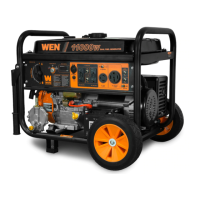GENERATOR SAFETY WARNINGS
OPERATING ENVIRONMENT
1. Using a generator indoors can KILL YOU IN MINUTES. Only use a generator outside and far away from win-
dows, doors and vents.
2. Do not operate near open flame or flammable materials. This generator may emit highly flammable and
explosive gasoline vapors, which can cause severe burns or even death if ignited. A nearby open flame can
lead to an explosion even if it isn’t directly in contact with gasoline.
3. Do not smoke near the generator.
4. Do not use the generator in rainy or wet conditions; doing so significantly increases the risk of electrical
shock.
5. Always operate the generator on a dry, firm, level surface.
6. Do not allow children or non-qualified persons to operate the generator.
7. Do not use or store LPG cylinder in a building, garage or enclosed area. Failure to do so will result in death
or serious injury. Liquid Petroleum Gas (LPG) is highly flammable and explosive. Flammable gas under pres-
sure can cause a fire or explosion if ignited. Always keep the LPG cylinder in an upright position. The LPG
cylinder valve should be turned OFF (closed) when generator is not in use; failure to do so could result in death
or serious injury.
GENERATOR PREPARATION
1. Always ground the generator before using it to maximize safety (see “GROUND THE GENERATOR” section
on page 18).
2. Always make sure generator is turned OFF before filling the fuel tank. Do not overfill fuel tank, as gaso-
line may expand during operation. Do not fill to the very top of the tank. Leave room for gasoline expansion.
Always check for spilled fuel before operating.
3. Do not use receptacles or cords that show signs of damage, such as broken or cracked insulation. If
any part of the generator or electrical device is broken, damaged, or defective, make sure it is repaired or
replaced before operation. Service should only be performed by a qualified technician.
4. Use a ground fault circuit interrupter (GFCI) in highly conductive areas such as metal decking or steel
work. Extension cords with in-line GFCIs are recommended for these operations to maximize safety.
5. NEVER connect the generator to a building’s electrical system without consulting a qualified electrician.
Such connections must comply with local electrical laws and codes. Failure to comply can create a back-
feed, which may result in serious injury or death to utility workers.
WARNING: Do not let comfort or familiarity with the product replace strict adherence to product
safety rules. Failure to follow the safety instructions may result in serious personal injury.
6

